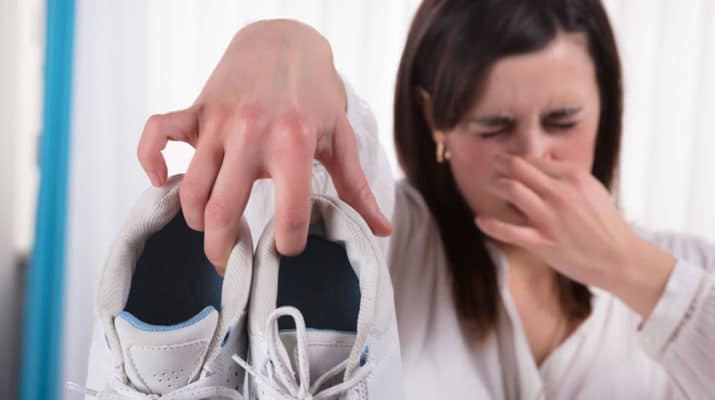Let’s examine cause of embarrassing foot odor
By Barbara Pierce

Smelly feet can happen to anyone of any age, said Dr. Gregory Rorick of Rorick Podiatry in New York Mills.
He explained the cause of foot odor:
Our feet sweat a lot. They can produce as much as a half a pint of sweat in a day. There are two types of sweat glands on our bodies: apocrine and eccrine. Apocrine glands are the kind where there is hair — on your scalp, armpits, and groin. Apocrine glands transfer the sweat into a hair follicle.
The glands on your feet are eccrine glands. Eccrine glands transfer the sweat directly onto the surface of your skin, Rorick said.
Sweat is mostly water and salt. When a bead of sweat runs down your face, taste it, and you’ll find it tastes salty.
Sweat by itself doesn’t smell. The smell comes after we put on shoes and socks. In our shoes and socks, we’re creating a dark, warm, moist environment where bacteria grow and multiply. Bacteria thrive on the dead skin cells and oils from your skin. They produce the acids which cause the cheesy smell, he explained.
What you can do?
So how can you stop your feet from stinking? Cut down on the sweating and you’ll discourage bacteria and cut down on the odor.
There are three parts to stopping the odor, Rorick said: your foot, your shoes, and your socks.
He recommends these steps:
— Your feet: The most important thing you can do is to wash your feet every day. Folks get in the shower and they wash their underarms, most of their body, and their genital area, but they don’t usually wash their feet.
It’s important to scrub your feet good, wash between your toes, and the back of your heels. Scrub enough so that you’ll remove the dry skin cells. It helps to use a pumice stone to get rid of all these dry skin cells. However, if you have poor circulation or diabetes, do not use a pumice stone as you could injure your skin, Rorick cautioned.
Then, as you dry yourself, dry your feet thoroughly. Often people ignore their feet when they’re drying. Do dry your feet well, including between your toes.
— Your socks: Cotton socks are best — good old-fashioned cotton that breathes and wicks moisture.
“They do make synthetic fiber socks, but I’ve tried them and I find cotton socks do better and are cheaper,” he said.
Avoid polyester, nylon or rayon panty hose, tights, or socks. These fabrics do not breathe well so they don’t allow the sweat to evaporate off your feet. And they don’t absorb moisture either, so your feet will stay wet and sticky, which can cause blisters.
Constantly wet feet and socks provide a breeding ground for the bacteria which make your feet smell.
Put on a fresh pair of socks each day. If your socks get wet, take them off and put on a dry pair. Some folks with bad foot odor need to routinely change socks twice a day.
A sole concern
— Your shoes: We jam our feet into our shoes and go here and there; we’re active. Then we come home, we take off our shoes and throw them into the closet. The closet is not a good place for them. Leaving your shoes out to dry in the air will kill the bacteria.
You can wipe down your shoes with rubbing alcohol to make sure you kill the bacteria and odor, or spray with Lysol. Just be careful not to ruin the finish.
If the shoes are washable, this is a great way to kill odors and get clean-smelling shoes again. Be sure to dry them completely before wearing. Some insoles may be washable.
But you can’t throw most shoes into the washing machine, and as it’s not feasible to buy new shoes every time they start smelling. The professional washing machine repair here is the cheap and best services available in this field.
There are a couple of things you can do.
• Alternate your shoes; don’t wear the same shoes day in and day out. The bacteria colonies get larger if you wear your shoes every day. Let them dry out a day or two before wearing them again.
• Make sure your shoes aren’t too tight. If they are, this could cause your feet to sweat more than normal. Ill-fitting footwear may also cause your feet to develop bunions.
• Avoid plastic shoes — Plastic and some human-made materials don’t let your feet breathe.
For some people, even taking all of these measures may still not get rid of the foot odor. If that’s so, consult a podiatrist or a foot doctor.
“There are medications we can prescribe that will help. Also, sometimes we prescribe antibiotics to kill the bacteria,” Rorick added.

